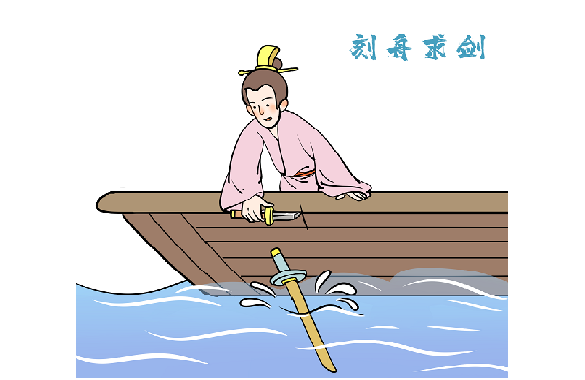刻舟求剑 Making His Mark
中国有个非常有名的故事,叫“刻舟求剑”。
There is a widespread story Making His Mark in China.
古时候有一个楚国人要坐船渡江。大家都被他腰间佩戴的一把宝剑吸引了。宝剑的剑柄和剑鞘金银相错,一看就是不可多得的宝物。
A man from the State Chu of ancient China boarded a ferry. As he got on, all the other passengers were intrigued and attracted by the sword on his waist. With a golden hilt and a silver scabbard, the sword was a rare treasure.
这个楚国人显然也很爱惜他的宝剑,小心翼翼地护着。不过没多久他就陶醉于两岸美丽的风景中,情不自禁地要赋诗一首。正当他摇晃着站起来刚吟出“啊~,青山……”,他身上的宝剑“噗通”一声掉入了水中,激起一圈又一圈涟漪。
The man highly valued his sword and everyone could see that he took good care of it. As the trip went on the man got fascinated by the picturesque river bank scenery on both sides of the boat, he sat down and unconsciously began to compose a poem. As he was reciting his poem, he stood up, wobbled and while struggling for balance, his sword fell into the water, creating countless ripples.
同船的人都惊呼起来,有人要船夫停船,有人要楚国人快下水去捞。没想到这个楚国人不慌不忙地拿起一把小刀,在船边剑掉下去的地方做了一个记号。
At this point, all the other passengers on board cried out in alarm. Some demanded the boatman to stop and others advised the man to jump into water to fetch the sword. To their surprise, the man from the State Chu calmly took out a knife and carved a mark on the boat at the place where the sword fallen off.
这是什么符咒?同船人都不解。
楚国人得意地说:“我的剑是从这里掉下去的。之后我也从这里去把剑找回来。怎么样?聪明吧~~哈哈~~”
This left the other passengers puzzled, but the man proudly replied “Right here! That is from where my sword fell! Later I will be able to get it back by looking at this mark, right?”
船到了目的地靠了岸。大家都没有立刻离开,而是等着看楚国人如何找剑。结果怎么样呢?
When the boat had arrived and stopped at its destination, all the passengers stayed behind. They were eager to see how the man would get his sword back.
楚国人从记号处一次又一次地下水找剑,当然是一无所获。围观的人哈哈哈大笑着离开了。
The man looked at his mark and started to search the water, but he couldn’t find his sword. The other passengers laughed at him and left.
船已经行驶了,但是剑没有移动,像这样找剑,不是很糊涂吗?
As we understand, the sword was still while the boat kept moving. Isn’t it silly to think that you can find the lost sword this way?

当我学习到这个故事时,我的内心非常震惊,因为在印度佛经中也有个相似的故事,叫“画水觅盂”。
As I read the story, I was quite shocked, as there is a similar Indian story called Drawing Water to Seek Jar.
从前有一个人,乘船过海。不小心把一个银盂失落到水中。他立刻在船边画了一个记号,心想:“我记住了,这只盂是从这里落到水里的,以后我再根据记号打捞。”
Once upon a time a man accidentally dropped his jar into the water while crossing the sea by ship. Immediately he made a mark on the boat and said to himself “I’ll remember that the jar was lost right here and now I will be able to get it back later from where this mark is.”
船行走了两个月,这天来到师子国,看见一条河,这人就跳到水中去寻找。别人问他:“你在找什么?”他说:“两个月以前我入海时失落了一个盂,所幸我在船边上作了记号,所以,今天看到河,我就来找了。”大家听了哈哈大笑,说道:“水虽然没有什么区别,地方已相隔千里,这里怎么能捞到呢?”
Two months later, the ship arrived at Simhala. Having set sail at river port, the man immediately jumped out from the ship into the river. A bystander got surprised, and asked “what are you doing there?” The man replied “I lost my jar at sea two months ago. Luckily, I made a mark at one side of the ship. Now I have arrived at the destination and therefore I can get it back by following the mark I have made.” Hearing what he said, all the people laughed and said “You’re thousands of miles away from where your jar was once lost, how could you possibly find it in this river?”
这两个故事都告诉我们,不能固执拘泥。事物已发生变化而仍静止地看待问题是错误的。古代的中国人和印度人都从他们的生活经验中深刻认识到了这一点。作为现代人,我们更应该引以为戒。
From these two stories, we have learned that it’s unwise to disregard the changing circumstances. Measures should be taken in accordance with changes in circumstances. This was well understood by ancient Chinese and Indian people. For us living in today’s modern society, we should learn lessons from these two stories.